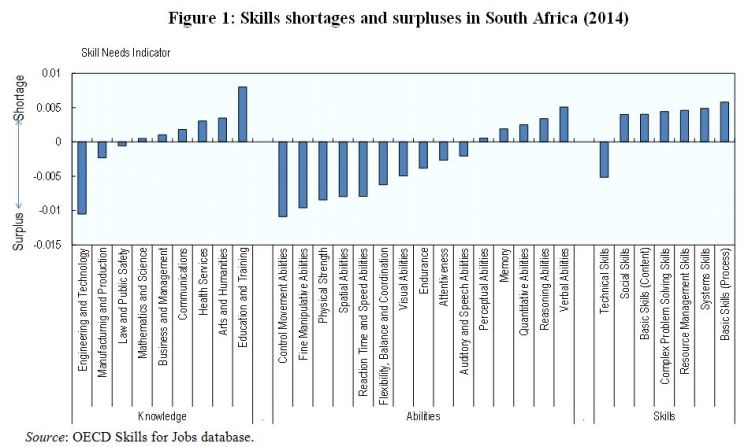Getting skills right in South Africa
[ad_1]
By Marieke Vandeweyer
South Africa has suffered from persistently high unemployment and low labour force participation rates. The resulting under-use of skills is a waste of valuable productive resources and is likely to lead to skills depreciation and obsolescence. Not having the right skills in the first place is also hampering many South Africans from entering the labour market or progressing to more stable, better paid jobs. These problems are particularly acute among youth, individuals from disadvantaged backgrounds and low-skilled individuals, with these three groups overlapping to a large extent. Notably, while youth represent a large part of the working-age population in South Africa, almost one in three is neither employed nor in education or training.
To support the South African authorities in making the best use of its human capital, the OECD has released the Getting Skill Right: South Africa report. The report is one of a series of country studies that look at the issue of skills imbalances, building on the evidence from the OECD’s Skills for Jobs indicators.
Imbalances between the supply and demand for skills are large in South Africa. While educational attainment has been on the rise, many South Africans leave the education system with poor basic skills before finishing upper secondary education. This makes school-leavers ill-equipped for the demands of today’s labour market, in which cognitive skills are in shortage while manual and physical skills are in surplus (Figure 1).

South Africa also faces high qualification and field-of-study mismatch (Figure 2). Limited availability of tertiary-qualified workers has meant that employers looking for high-skilled workers in emerging and innovative sectors have had little choice but to hire underqualified workers. At the same time, the large pool of available unemployed high-school graduates has led to the displacement of those without qualifications, as employers looking for low-skilled workers hire high-school graduates instead, generating over-qualification. The result is a staggering 52% incidence of qualification mismatch in South Africa. In addition, more than 30% of South African workers are employed in an occupation unrelated to the field of study of the qualification that they hold.

Promoting skills development is a key priority in many of the South African government’s plans and strategies, and several actions have been taken to bring skill supply more in line with demand. This includes: a bursary and loan system to invest in further education and training; a National Skills Fund to finance certain skill development programmes to respond to labour market needs; and skills recognition tools for individuals without formal qualifications. To better steer skills development, a career advice system has been developed and employers are encouraged to provide workplace training through a skills development levy system and tax incentives for hiring learners. Finally, the entry of non-nationals with skills in shortage is facilitated through the introduction of a Critical Skills Visa.
Despite these efforts, several challenges remain, particularly in the implementation of some of the measures put in place. The OECD report calls for more action, including:
- Provide tailored career advice to students early on, based on better skill needs information.
- Involve employers in the planning and provision of vocational education in order to achieve a better alignment with workplace practices and local needs.
- Stimulate on-the-job training by reducing the administrative burden on employers for claiming back the skills development levy and by promoting existing tax incentives.
- Promote recognition of prior learning among employees and employers, as well as the unemployed.
- Scale up the efforts for training of the unemployed, and make the Public Employment Service a one-stop-shop where they can obtain advice on and register for suitable training options.
- Strengthen the role of Sector Education and Training Authorities to serve as intermediaries between employers and training providers.
Other policy recommendations and good practice examples from other countries can be found in the full report. More detailed results from the Skills for Jobs database for South Africa are described in the South African Skills for Jobs country profile.
[ad_2]


 South Africa has suffered from persistently high unemployment and low labour force participation rates. The resulting under-use of skills is a waste of valuable productive resources and is likely to lead to skills depreciation and obsolescence. Not having the right skills in the first place is also hampering many South Africans from entering the labour market or progressing to more stable, better paid jobs. These problems are particularly acute among youth, individuals from disadvantaged backgrounds and low-skilled individuals, with these three groups overlapping to a large extent. Notably, while youth represent a large part of the working-age population in South Africa, almost one in three is neither employed nor in education or training.
South Africa has suffered from persistently high unemployment and low labour force participation rates. The resulting under-use of skills is a waste of valuable productive resources and is likely to lead to skills depreciation and obsolescence. Not having the right skills in the first place is also hampering many South Africans from entering the labour market or progressing to more stable, better paid jobs. These problems are particularly acute among youth, individuals from disadvantaged backgrounds and low-skilled individuals, with these three groups overlapping to a large extent. Notably, while youth represent a large part of the working-age population in South Africa, almost one in three is neither employed nor in education or training.